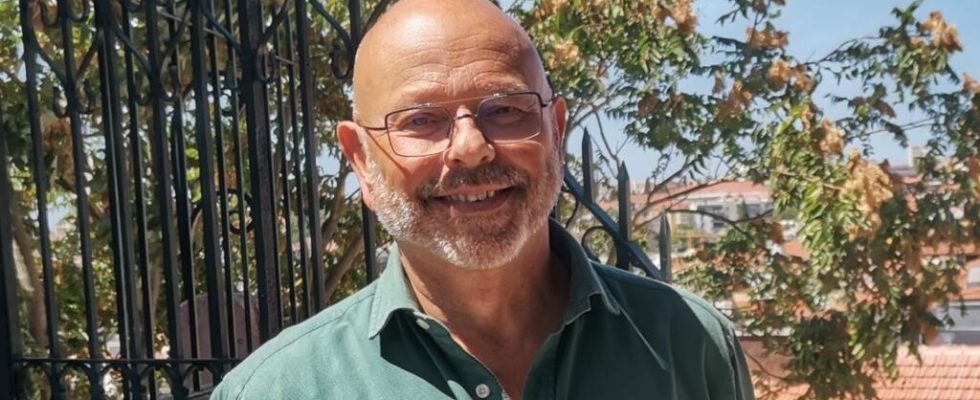Actor, director, producer, teacher, Miguel Abreu, 60 years old, revolutionized Portuguese theater. A life of jack-of-all-trades in theater. A multifaceted artist, we owe him real theatrical “revolutions” with a significant impact on Portuguese society.
5 mins
From our correspondent in Lisbon,
Principe Real is a cosmopolitan neighborhood in central Lisbon. Its bohemian chic spirit where “kiosks” serve refreshing drinks in the shade of a small exotic garden is very popular with tourists and Portuguese intellectuals. “ I studied in this neighborhood. Today, I have my office and my apartment there. I like Principe Real from where you can walk to most of the places of culture and amenities in the city center », explains Miguel Abreu.
Sitting at the pink kiosk at Principe Real, over a coffee and a glass of water, Miguel talks about his life as an actor, producer and director. A life of jack-of-all-trades in theater which gave him a solid artistic reputation. We owe him real theatrical “revolutions” with a significant impact on Portuguese society. Now 60 years old, this multifaceted artist displays a contagious joviality, served by a round face, square glasses which are not enough to make him a pure intellectual, and a shaved head, ” assumed baldness ” since a long time. “ People think I’m nice, it’s true. But I am extremely critical and can get angry when we cross the limits of respect and dignity.é” he confides.
The man has long fought against indifference towards those truly responsible for theatrical production, actors and other technicians. The best way to do this was to set up its own production house, Cassefaz, in 1987. The world of theater was still marked by the post-democratic revolution of April 25, 1974. ” On one side, there was a theater of intervention tinged with the extreme left, and on the other a theater of “bosses” marked to the right. Enthusiasm for theater was waning. We, the April generation, were the true democrats and wanted to create a truly independent space » explains the producer.
Rebel and freedom-loving
He was 11 years old when the democratic revolution of April 25, 1974 took place. A vivid memory punctuated by his mother’s counting on each of her birthdays of the number of years the child had left before leaving to fight the colonial war . “ Huge fear and all mothers would have embraced any revolution, keeping their children out of danger » explains Miguel. He wanted to be a lawyer. But his modest family – father a bank employee and mother working at public radio – did not have the connections needed to get him into big firms. He says he is rebellious, like his mother, and freedom-loving. He will make it the backbone of his private and artistic choices.
In 1993, the piece Life as an artist or the true story of Barbi will truly propel Portuguese theater into the world of freedom that Miguel dreams of. Inspired by a play by Guy Bedos, the actor created the character of Tucha, a “ tia » (aunt), caricature figure of the good bourgeoisie of the time, still stuck in the remains of the gray shackles of Salazarism.
Cassefaz produces the piece which integrates two other “tias », just as “pseudo-chanellized” as their friend Tucha. The play is a fierce and funny portrait of Portuguese society. The fact that three men play these bourgeois women is a real event. Never vulgar, with great technical interpretation, the piece is a triumph. “ Les Barbis was above all about bringing cross-dressing out of its reserved places, the cabaret, the carnival or the boulevard theater » explains the actor. More a Europeanization of Tabuki theater than a pro-homosexual manifesto. The Barbis, thirty years later, are still in people’s minds.
The Todos festival, or walks of cultures
“ I always pee next to the bassinet, as they say in Portuguese » said Miguel Abreu with a burst of laughter. His outspokenness is a trademark. It’s also a way of protecting himself from routine, which he hates, including in his love life, which always ends up giving way under the attacks of boring everyday life. “ I refused to let myself be locked into the genre of cross-dressing, despite the fabulous success of plays like Barbis and others. I had to create “.
The projects will come one after the other, the doors will open with ease. While Lisbon wants to join the network of intercultural European Capitals, it offers the municipality the festival “Todos “, All. “ I refused the grandiose idea of Immigrant Day. It’s not for me. Instead, I suggested moving into a neighborhood, that of Intendente, known for its diversity of populations. »
It’s about bringing cultures together and Miguel focuses on visual arts to overcome the language barrier and occupies the streets and squares of the neighborhood. “ Three years in the same neighborhood, no more… no routine » explains the ebullient Miguel whose flow of words never stops. In 2023, Todos completes a 15-year cycle, and ends in the mixed-race neighborhood of Ameixoeiras, where older white people who returned with decolonization rub shoulders – poorly – with young black people born in Portugal.
Without forgetting the strong gypsy community. “ Not easy » recognizes Miguel whose initial enthusiasm has not waned. Success again for this generous urbanite, a lover of the sun and the beach, of the Alentejo and the good things ” of life. “ Tomorrow ? We’ll see ! “. And Miguel left with a smile to contemplate his garden, an infinite source of inspiration.
